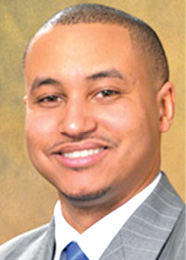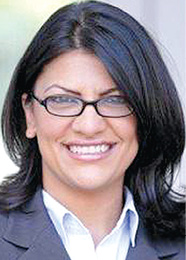
 Name recognition and clout have always paid off in politics regardless of whether the candidates are qualified or not.
Name recognition and clout have always paid off in politics regardless of whether the candidates are qualified or not.
Added to that is the power of fundraising, demonstrating whose numbers and personal contacts are in a candidate’s Rolodex and who is connected to who based on longstanding political patronage, familiarity and advocacy on the issues facing voters.
In this coming election, one of the most watched political races and perhaps the most intriguing local legislative campaign is in Senate District 4 where former State Rep. Rashida Tlaib is taking on incumbent Sen. Virgil Smith Jr.
This race has all the makings of political intrigue because even though Tlaib and Smith have two other challengers in the race, Howard Worthy and Keith Franklin, it’s the Tlaib-Smith battle that most are watching right now, because each made it in politics through very different routes.
Consider this: Tlaib became a known entity in Southeast Michigan politics when she was elected to the State House representing Southwest Detroit. She marched into Lansing like a rising star also because of her identity as an Arab American giving voice to the aspirations of the Arab-American community even though her district was mostly Hispanic voters. She represented the pride of that community for her breakthrough political storyline.
In Lansing, her most notable battle will be remembered as taking on Manuel “Matty” Maroun, the billionaire owner of the Ambassador Bridge on a host of issues that included pollution (environmental hazards) in the Southwest Detroit community. Her long battle against the Maroun empire sometimes made some, including supporters of Maroun, wonder if Tlaib was engaging in a personal crusade against a rich old White man.
But the courage to do so, according to some who support Tlaib, is needed in politics. Her consistence in fighting for issues that the Marouns are diametrically opposed to clearly have paid off for her. She has become known as a fighter and one who is not afraid to take on the battles necessary in politics. She is a rising star in Michigan Democratic politics. Those who support her say she is the definition of diversity at work in politics and why people of her ilk can no longer sit back and watch others decide their future.
On the other hand, Smith, comes from a prominent political family. His father, Virgil Smith, is a respected jurist and was the former chief judge of the Wayne County Circuit Court among other longstanding titles he has held in Detroit and Wayne County government.
In many ways, the young Smith is carrying on the legacy of a family tradition of commendable public service, according to his supporters. He has managed to stand on his own merits, not being defined by what his father has done even though siblings of political families find it difficult to differentiate themselves from their parents. No matter what they have done they carry the weight and legacy of their family’s contributions to public service and they are always viewed through the prism of what their parents have done.
But Smith notably has carved out a niche for himself in Lansing, fighting against the mighty insurance lobby by pushing for an end to insurance redlining. In fact, his master’s thesis was on insurance redlining, a copy of which was sent to the Michigan Chronicle. Those who support him say he shows the promise of young African-American political leadership in Detroit and following in the footsteps of his father when he could have chosen a different direction than public service.
In essence, the battle to represent District 4 in the Michigan Senate is significant in many ways because Tlaib and Smith both bring legislative experience to their campaigns aside from being known political entities in Southeast Michigan.
The question is, who would voters trust to send to Lansing?
In an endorsement questionnaire sent out last week, the two candidates offer different, unique answers to the same questions the Michigan Chronicle posed.
For example, when asked what are the three top issues each will push if elected to the State Senate, Tlaib offered this answer:
“As state representative, I served as the ranking Democratic member of the Appropriations Committee, where I was able to leverage funding for programs that serve our communities’ best interest, such as obtaining funds for before-and-after school programming and for Michigan’s first community court program. I hope to continue to do that work in behalf of Michigan’s 4th Senate District, where I will fight to improve funding for public education, improving public safety and our quality of life by addressing public health issues.”
Smith answered as follows:
“The Port of Detroit is a very important issue to me. I want to see the port work and expand so that it can be an economic engine for Detroit. SB 867, my ‘anti-senior abuse’ bill. This bill will increase criminal penalties against those that commit both violent crimes and financial fraud against seniors. The high rate of auto insurance is a serious detriment to getting families to move and live in Detroit. I have two bills, SB 326, which will provide low cost auto insurance for those that make 300% or less of the federal poverty guidelines, and SB 226, which will change the definition of an excessive rate so that the insurance commissioner will finally have the tools to go after insurance companies that are gouging consumers.”
Both candidates found a common ground regarding the Detroit bankruptcy.
Tlaib said she did not support the city entering into bankruptcy and Smith indicated the same.
And what about the Grand Bargain, the package of bills passed into law in Lansing that allowed for $195 million to be sent to Detroit to help settle the bankruptcy?
“I voted for the Grand Bargain,” Smith said.
Tlaib gave a longer response.
“I supported the Grand Bargain legislation because I feel that it will help bring our city out of bankruptcy more quickly. The appropriation of $194.8 million will provide a much needed boost to the city retirees’ pension fund, and the annual payments of $17.5 million in tobacco settlement funds will provide stability to that fund, ensuring there are funds for the retirees who have served our city,” she explained.
“While the deal isn’t perfect, it does boost Detroit’s exit from bankruptcy while ensuring that retirees not sacrifice their economic security.”
Voters will decide whether Smith, Tlaib, Worthy or Franklin will represent District 4 in the Senate.
Bankole Thompson is the editor of the Michigan Chronicle. Email bthompson@michronicle.com.

